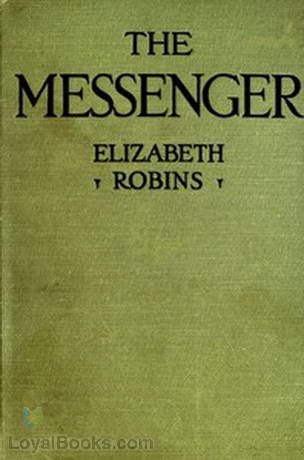The Messenger By: Elizabeth Robins (1862-1952) |
|---|

The Messenger by Elizabeth Robins is a captivating and thought-provoking novel that delves into the depths of personal identity, societal expectations, and the power of communication. Set in late 19th century England, the story follows Lucy Messenger, a talented and ambitious actress who becomes entangled in a web of social constraints and gender roles. Robins skillfully portrays Lucy as a strong and resilient protagonist who challenges the norms of her time. Through her journey, we witness Lucy's determination to be more than just a puppet controlled by the expectations of others, particularly men. Her struggles against the suffocating confines of society's limitations are both relatable and inspiring, as she navigates her way through the male-dominated theater industry and advocates for equal opportunities. One of the novel's greatest strengths lies in its exploration of the power of communication. Robins skillfully uses dialogue as a vehicle for her characters to express their thoughts and ideas, revealing their true selves in the process. Lucy's ability to communicate effectively becomes an essential tool in her quest for self-realization, as she learns the importance of finding her own voice amidst the noise of societal dictations. The supporting characters in The Messenger are equally well-drawn and play significant roles in Lucy's journey. From Countess Ameraghi, a progressive and fiercely independent woman, to Archie Worthington, a playwright who becomes a close confidant, each character brings depth and nuance to the narrative. The relationships that develop between Lucy and these characters add layers of complexity to the story, allowing for rich interpersonal dynamics and meaningful introspection. Robins' prose is elegant and evocative, transporting readers to a bygone era while simultaneously addressing timeless themes. Her attention to detail immerses us in the world of Victorian England, from the opulent theaters to the bustling streets of London. The vivid descriptions of the sights and sounds add a sensory dimension to the narrative, enhancing our understanding of the characters' experiences. Although The Messenger is a somewhat slow-paced novel, the deliberate pacing allows for a deeper exploration of the characters' motivations and desires. Robins expertly balances introspection with external events, never veering too far into one realm at the expense of the other. This thoughtful approach keeps the reader engaged, always eager to uncover the next layer of Lucy's journey. Overall, The Messenger is a remarkable novel that tackles important themes with sensitivity and skill. Elizabeth Robins' exquisite writing and compelling characters create a world that feels both familiar and foreign, challenging readers to reflect on their own lives and the power of personal agency. Whether you are interested in historical fiction, feminist literature, or simply enjoy a well-crafted story, The Messenger is a book that deserves a place on your reading list. First Page:THE MESSENGERby ELIZABETH ROBINS Author of "Come and Find Me," etc. With Illustrations by George Giguére New York The Century Co. 1919 Copyright, 1919, by Elizabeth Robins Copyright, 1918, 1919, by The Century Co. Published, September, 1919 TO S. C. [Illustration: "Now your finger print, if you please"] LIST OF ILLUSTRATIONS "Now your finger print, if you please" "O Gavan, save me!" "I have a cabin below. I place it at the lady's disposal" "The name of the man in the War Office!" THE MESSENGER CHAPTER I "After all, we aren't yet living in the millennium, Julian. What I'm afraid of is that some day you'll be wanting to carry these notions of yours beyond the bounds of what's reasonable." "You mean," said the other young man, with a flash in his dark eyes, "you mean you're afraid I may just chance to be honest in my 'notions,' as you call them, of a scheme of social justice." As far off as you saw Gavan Napier, you knew him as a scion not only of the governing class, but in all likelihood of one of the governing families. Exactly the sort of man, you would say, to have Eton and Balliol in the past, a present as unpaid, private secretary to a member of his Majesty's Government, and a future in which the private secretary himself would belong to officialdom and employ pleasant, more or less accomplished, and more rather than less idle, young gentlemen to take down occasional notes, write an occasional letter, and see a boring constituent... Continue reading book >> |
| eBook Downloads | |
|---|---|
|
ePUB eBook • iBooks for iPhone and iPad • Nook • Sony Reader |
Kindle eBook • Mobi file format for Kindle |
|
Read eBook • Load eBook in browser |
Text File eBook • Computers • Windows • Mac |
| Review this book |
|---|